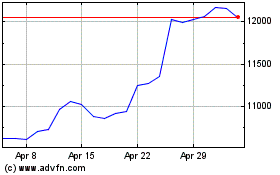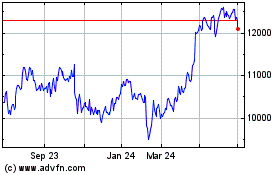Covid-19 Vaccine Trial From AstraZeneca, Oxford Can Resume in U.S. -- 2nd Update
October 23 2020 - 4:41PM
Dow Jones News
By Thomas M. Burton
Federal health regulators allowed the resumption of U.S. studies
of a leading Covid-19 vaccine candidate from AstraZeneca PLC and
the University of Oxford, according to a person familiar with the
matter and materials reviewed by The Wall Street Journal.
The U.S. Food and Drug Administration wrapped up its examination
of two cases of a possible neurological side effect that emerged in
two people in clinical research testing the shot. The agency told
AstraZeneca that the late-stage trial in the U.S. can resume, the
company said Friday.
The decision, which was first reported by The Wall Street
Journal, came after the FDA didn't find the vaccine was responsible
for the two cases, though the agency couldn't rule out a link
either, a person familiar with the matter said.
The agency plans to require researchers to inform study subjects
of the cases and monitor them for any related neurological events,
such as numbness, the person said.
The move "allows us to continue our efforts to develop this
vaccine to help defeat this terrible pandemic. We should be
reassured by the care taken by independent regulators to protect
the public and ensure the vaccine is safe before it is approved for
use," AstraZeneca Chief Executive Pascal Soriot said in a
statement.
The vaccine is among the most advanced in development. If it
proves to work safely, it could be one of the first, if not the
first, greenlighted by regulators for widespread use.
The vaccine had been on track to be authorized for widespread
use before year's end, if it proved to work safely in the
late-stage testing.
Last month, however, AstraZeneca paused trials testing the shot
around the world, including in the U.S., after a U.K. woman
developed a mysterious neurological illness. A U.S. health official
had said the event involved a spinal cord problem.
The illness followed a pause in testing, in July, after an
unexplained illness of a trial subject. Researchers initially told
subjects in the study the case involved a neurological disorder
known as transverse myelitis. AstraZeneca later said the case
turned out to be multiple sclerosis unrelated to the vaccine, and
the testing resumed.
Studies testing the vaccine around the world later resumed after
regulators outside the U.S. determined it was safe to do so, except
a late-stage trial in the U.S. because the FDA was still
investigating the two events.
The FDA has spent weeks exploring whether the two cases involved
transverse myelitis and whether the vaccine was responsible for the
illness, the person said.
An AstraZeneca spokesman has said the company was working with
the FDA so it can evaluate whether the U.S. trial can resume. All
the studies testing the shots are being closely watched for safety,
including by health regulators in various countries, the spokesman
said.
Reuters had earlier reported the U.S. trial could resume this
week.
Transverse myelitis is a known side effect of vaccines but is
rarely linked to the shots. Other times, it is an early symptom of
the nerve-system disease multiple sclerosis, and unrelated to
getting a shot.
The condition refers to inflammation of the spinal cord
involving the destruction of a fatty white material, known as
myelin, that insulates nerve cell fibers. It impedes the ability of
nerves in the spinal cord to send messages to the rest of the
body.
Cases are rare, with only about 1,400 diagnosed annually in the
U.S. The cause is unknown. It can trigger a variety of symptoms,
including weak arms and legs, along with sharp pains, numbness and
tingling.
It can sometimes also lead to paraplegia that necessitates
wheelchair use.
Experimental vaccines undergo study, in trials that
progressively test the shots in increasing numbers of volunteers,
both to test effectiveness and to look for any side effects that
could harm people if regulators greenlighted the vaccines and they
were then given widely.
To protect trial subjects, independent researchers who didn't
play a role in the vaccine's development, or at the company that
would sell it, look for any signs that the shot could be harmful.
This data-safety monitoring board evaluates side effects in
subjects.
Side effects often emerge in trials evaluating drugs and
vaccines, and the studies are frequently paused for researchers and
regulators to make sure it is safe to go on.
Since the trial for the vaccine from AstraZeneca and Oxford was
put on hold, studies of Johnson & Johnson's Covid-19 vaccine
candidate and of a combination of Eli Lilly & Co.'s antibody
and Gilead Sciences Inc.'s antiviral remdesivir w ere paused.
AstraZeneca was among the drugmakers that pledged to not seek
regulators' permission for widespread use of their Covid-19
vaccines until the shots proved to work safely in late-stage
testing.
--Joseph Walker contributed to this article.
Write to Thomas M. Burton at tom.burton@wsj.com
(END) Dow Jones Newswires
October 23, 2020 16:26 ET (20:26 GMT)
Copyright (c) 2020 Dow Jones & Company, Inc.
Astrazeneca (LSE:AZN)
Historical Stock Chart
From Mar 2024 to Apr 2024

Astrazeneca (LSE:AZN)
Historical Stock Chart
From Apr 2023 to Apr 2024
